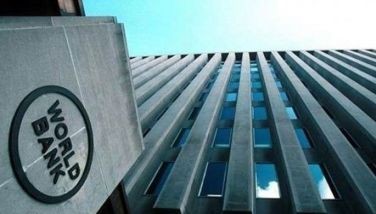Inflation fears prod BSP to maintain rates
June 22, 2001 | 12:00am
Amid concerns that a fast weakening peso could fuel higher inflation the Monetary Board (MB), the policy-making body of the Bangko Sentral ng Pilipinas (BSP), decided yesterday to keep its benchmark overnight interest rates unchanged.
The MB maintained the overnight borrowing and lending rates at nine percent and 11.25 percent, respectively.
"Notwithstanding market expectations of lower rates, the Board reached this decision in recognition of recent movements in the peso-dollar rate and their implications for future inflation," the MB said in a statement.
Bangko Sentral ng Pilipinas Deputy Governor Amando Tetangco Jr. said "the Board saw the exchange rate movement in the past weeks as something that has been too fast compared to what is considered as normal movement."
He also hinted the BSP will go against speculators. "The Board has asked the BSP management to continue monitoring closely the foreign exchange activities of market players and has requested the recommendation of measures as may be needed."
Tetangco said the BSP expects the weakness of the peso to be temporary and will have little or no significant impact on inflation if the local currency bounces back soon against the US dollar.
A Malacañang-prepared paper on year-to-date movements of selected currencies against the US dollar shows the peso has dropped only 3.69 percent since Dec. 29, 2000.
Malacañang said it was not worried by the fall of the peso, saying the local currency is faring relatively better than other Asian currencies such as the Indonesian rupiah which has depreciated 15.4 percent while the Thai bath went down 4.2 percent.
The peso has been dragged down by the jittery foreign exchange market, concerned about the implication of the unresolved Abu Sayyaf hostage crisis and the resumption of kidnappings in Metro Manila.
Its continued depreciation has worried monetary authorities because it could push up inflation.
Inflation in May dropped to 6.5 percent after staying at 6.7 percent for three months. The BSP is targeting an average range of between six-to-seven percent inflation rate this year.
Earlier, BSP Governor Rafael Buenaventura said the overnight borrowing rate could be brought down to as low as 8.25 percent this year if inflation falls to 5.5 percent and settles at an average of 6.25 percent by yearend.
He said the BSP still expects an inflation downtrend starting this semester up to the first quarter of 2002, but this could change with the pressure on the peso.
The MB maintained the overnight borrowing and lending rates at nine percent and 11.25 percent, respectively.
"Notwithstanding market expectations of lower rates, the Board reached this decision in recognition of recent movements in the peso-dollar rate and their implications for future inflation," the MB said in a statement.
Bangko Sentral ng Pilipinas Deputy Governor Amando Tetangco Jr. said "the Board saw the exchange rate movement in the past weeks as something that has been too fast compared to what is considered as normal movement."
He also hinted the BSP will go against speculators. "The Board has asked the BSP management to continue monitoring closely the foreign exchange activities of market players and has requested the recommendation of measures as may be needed."
Tetangco said the BSP expects the weakness of the peso to be temporary and will have little or no significant impact on inflation if the local currency bounces back soon against the US dollar.
A Malacañang-prepared paper on year-to-date movements of selected currencies against the US dollar shows the peso has dropped only 3.69 percent since Dec. 29, 2000.
Malacañang said it was not worried by the fall of the peso, saying the local currency is faring relatively better than other Asian currencies such as the Indonesian rupiah which has depreciated 15.4 percent while the Thai bath went down 4.2 percent.
The peso has been dragged down by the jittery foreign exchange market, concerned about the implication of the unresolved Abu Sayyaf hostage crisis and the resumption of kidnappings in Metro Manila.
Its continued depreciation has worried monetary authorities because it could push up inflation.
Inflation in May dropped to 6.5 percent after staying at 6.7 percent for three months. The BSP is targeting an average range of between six-to-seven percent inflation rate this year.
Earlier, BSP Governor Rafael Buenaventura said the overnight borrowing rate could be brought down to as low as 8.25 percent this year if inflation falls to 5.5 percent and settles at an average of 6.25 percent by yearend.
He said the BSP still expects an inflation downtrend starting this semester up to the first quarter of 2002, but this could change with the pressure on the peso.
BrandSpace Articles
<
>
- Latest
- Trending
Trending
Latest






















